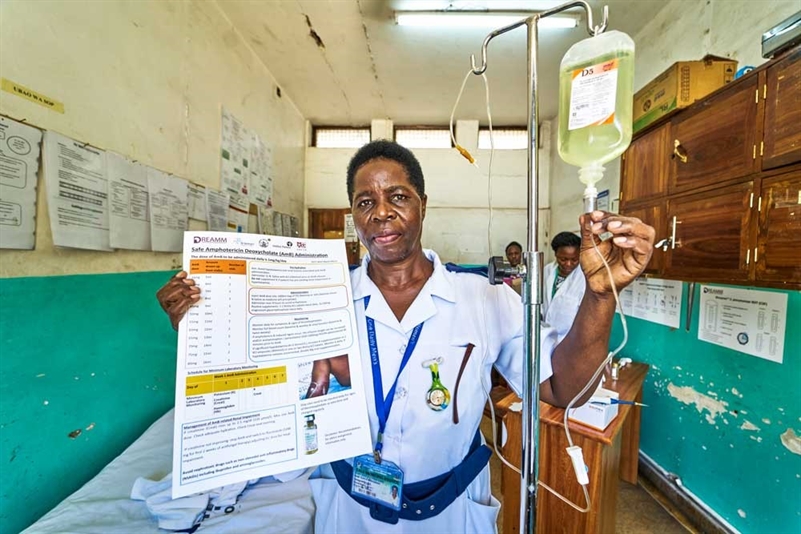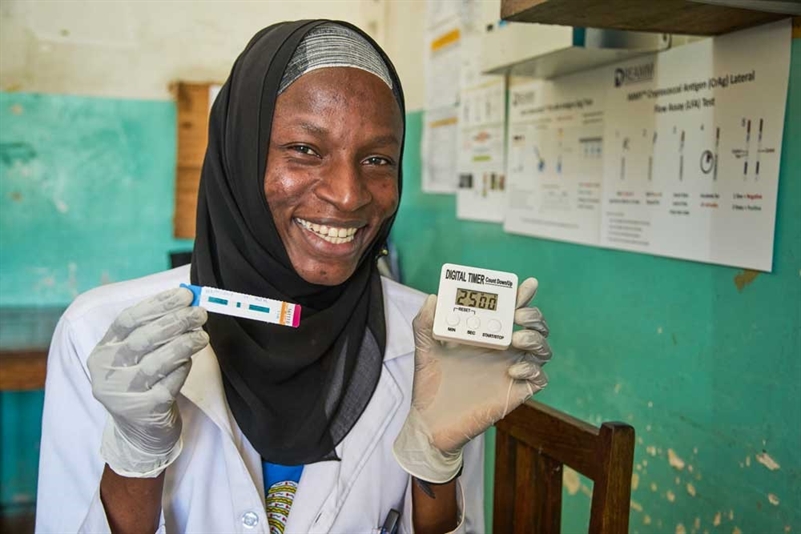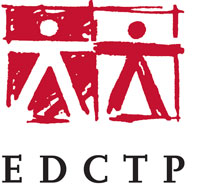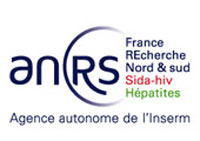
Background
-
Dates: April 2016 – September 2021
-
Chief Investigator: Dr Angela Loyse
-
Principal Investigators: Dr Cecilia Kanyama, Prof Sayoki Mfinanga, Prof Charles Kouanfack, Dr Saulos Nyirenda
-
Locations: Malawi, Tanzania, Cameroon
-
Funding: EDCTP and ANRS
DREAMM aimed to reduce mortality linked to HIV-related central nervous system infection (CNS) in resource-limited settings in Tanzania, Cameroon, and Malawi. Meningitis is a leading cause of HIV-related death in routine care settings across African low-and middle-income countries (LMICs).
 Sister Bupe from Amana Hospital, DREAMM clinical training, Safe Amphotericin B deoxycholate administration workshop, Dar es Salaam, Tanzania, September 2017. Photo courtesy of EDCTP.
Sister Bupe from Amana Hospital, DREAMM clinical training, Safe Amphotericin B deoxycholate administration workshop, Dar es Salaam, Tanzania, September 2017. Photo courtesy of EDCTP.
DREAMM was an implementation project that used a mixture of traditional clinical trial methodology combined with local health system strengthening, social science, education, and health economics.
A starting premise for the DREAMM project was independent African research leadership linking with hospital directors working in routine care services and their Ministry of Health counterparts. DREAMM had three project phases: 1) Observation, 2) Training and 3) Implementation. DREAMM study sites worked as test sites within country and region with collated health system process and epidemiological data informing local and regional public health policy.
DREAMM collaborators and study sites
DREAMM operated in southern, eastern and central Africa:
-
Amana and Mwananyamala hospitals, Dar Es Salaam, Tanzania
-
Kamuzu Central Hospital, Lilongwe, and Zomba Central Hospital, Zomba, Malawi
-
Hôpital Central Yaoundé (HCY), Yaoundé, Cameroon.
The DREAMM project is in collaboration with the following partners:
-
National Institute for Medical Research, Tanzania
-
University of North Carolina Project-Malawi
- Lighthouse Trust, Malawi
-
Yaoundé Central Hospital, Cameroon
-
Institut Pasteur, France
Why was DREAMM needed?
Mortality due to HIV-related meningitis remains unacceptably high in resource limited settings in African LMICs. This is due to a number of factors including:
-
late presentation to care
-
lack of specific training for frontline healthcare workers (HCWs) on the diagnosis and management of HIV-related meningitis
-
lack of access to appropriate diagnostic tests and essential medicines for meningitis such as amphotericin B and flucytosine
-
breakdown of routine laboratory pathways
-
poor communication between laboratory technicians and clinicians.
DREAMM interventions
DREAMM addressed many of the factors underlying high HIV-related mortality through the DREAMM intervention, including:
-
Provision of diagnostic tests and medicines
All patients were tested using rapid diagnostic tests (RDTs), the cryptococcal antigen lateral flow assay (CrAg LFA), and urinary lipoarabinomannan (LAM)) by the bedside, alongside routine basic microbiological techniques in the laboratory.
A new semi-quantitative CrAg LFA test developed between industry and Biosynex was also evaluated. The DREAMM project implemented the results of the ACTA trial, with patients diagnosed with cryptococcal meningitis receiving one week of amphotericin B and flucytosine or two weeks of fluconazole and flucytosine, in line with 2018 WHO guidance.
 Dr Djamila from Amana Hospital, clinical training workshop on bedside use of the urinary lipoarabinomannan (LAM) rapid diagnostic test, Dar es Salaam, Tanzania, September 2017. Photo courtesy of EDCTP.
Dr Djamila from Amana Hospital, clinical training workshop on bedside use of the urinary lipoarabinomannan (LAM) rapid diagnostic test, Dar es Salaam, Tanzania, September 2017. Photo courtesy of EDCTP.
DREAMM education programme
The DREAMM education programme aims to increase the knowledge of frontline HCWs to effectively diagnose and treat HIV-related meningitis. The programme includes posters, workshops and background theoretical modules. The workshops have been designed to focus on simple and practical interventions that can reduce mortality (e.g. safe antifungal drug administration). All of the materials have been created in conjunction with African researchers, hospital directors and frontline HCWs.
There are five training modules on:
-
Cryptococcal meningitis
-
Tuberculous meningitis
-
Bacterial meningitis
-
Toxoplasmic encephalitis
-
Neurosyphilis.
DREAMM Publications
Reduction in mortality from HIV-related central nervous system infections in routine care in Africa (DREAMM): A before-and after- implementation study
HIV-related CNS infections: translating DREAMM into reality
How to DREAMM and end HIV-related deaths
DREAMM Project advocacy
The DREAMM project includes advocacy work to improve access and procurement mechanisms in African LMICs for RDTs and essential medicines including flucytosine. Some of this work is encompassed by the work of the cryptcoccal meningitis action group (cryptoMAG) chaired by Dr Angela Loyse. You can learn more about cryptoMAG on the Working Internationally page.
Find out more about our work here
This project is part of the EDCTP2 programme supported by the European Union.


